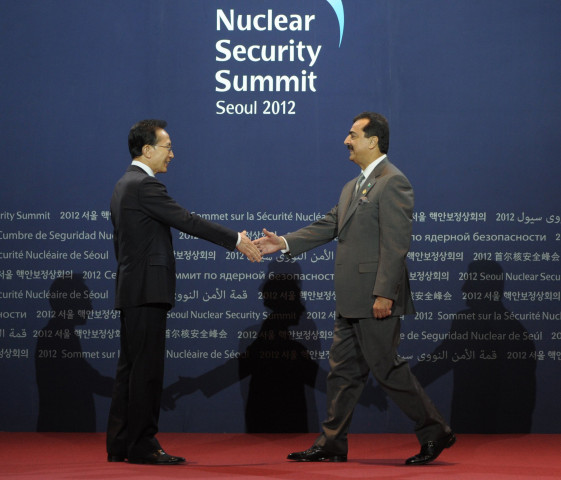Seoul summit: ‘Responsible’ Pakistan seeks civil nuclear tech
Gilani demands nuclear technology access for peaceful uses; says Pakistan has enhanced security of its atomic weapons.

With a snowballing electricity crisis at home and concerns about his country’s nuclear arsenal abroad, Prime Minister Yousaf Raza Gilani on Monday neatly put the two issues together.
He called upon the international community to give Pakistan access to nuclear technology for “peaceful uses on a non-discriminatory basis”.
“We need nuclear technology to meet Pakistan’s growing energy needs,” Prime Minister Gilani told leaders from 53 nations and four international organisations at a dinner on the opening day of the two-day nuclear security summit in the South Korean capital.
The premier also sought to assuage global concerns about the safety of his country’s nuclear arsenal. “Pakistan has taken effective measures which are the most important part of its efforts to enhance nuclear security,” Gilani said in his address.
Referring to the importance of the summit, the prime minister said, “As we meet here, we break new ground on the evolving global nuclear security architecture, the role of the IAEA, and protection of nuclear materials and radioactive sources.”
The premier said that last year the IAEA board of governors had unanimously approved the safeguard agreements of two civil nuclear power plants of Pakistan, which showed the international community’s continued confidence in the safety and security standards maintained by his country.
In South Asia, Pakistan is pursuing strategic restraint and confidence-building measures through dialogue, and this process should guarantee security and stability in the region, he added.
He said Pakistan had also been active in international diplomacy to promote nuclear security. PM Gilani further said that Pakistan had also developed a strong nuclear emergency response mechanism. “We have been implementing a nuclear security action plan in cooperation with the IAEA which reinforces physical protection of nuclear medical centres and civilian nuclear plants,” he said.
After the Fukushima accident in Japan, Pakistan carried out comprehensive stress tests of the nuclear power plants and refined and improved the safety parameters, he said.
Gilani said Pakistan had been deploying special nuclear material portals at key entry and exit points to detect, deter and prevent illicit trafficking of nuclear and radioactive materials. The PM said that, since the Washington summit, swift movement had been seen in the field of nuclear security. “Together, we have taken steps to create a secure world that will not live under the fear of nuclear terrorist attacks. We firmly believe that nuclear material must never fall into the hands of terrorists.”
In his speech, President Barack Obama said major progress had been made over the past two years to eliminate or safeguard material that could be used to make thousands of bombs.
“But we’re under no illusions. We know that nuclear material – enough for many weapons – is still being stored without adequate protection,” he said.
“We know that terrorists and criminal gangs are still trying to get their hands on it, as well as the radioactive material for a dirty bomb... the danger of nuclear terrorism remains one of the greatest threats to global security.”
Obama urged the world leaders to ‘keep at it’, and pledged further actions from the US including efforts with Russia to jointly cut their stockpiles.
He said that, with more than 1,500 deployed nuclear weapons and 5,000 warheads, the US had “more nuclear weapons than we need”. Obama again told North Korea to abandon its nuclear ambitions. “By now it should be clear, your provocations and pursuit of nuclear weapons have not achieved the security you seek, they have undermined it,” he said, in what he called a direct address to the North’s new leadership.
Obama also warned Iran that time was running out to resolve the standoff over its nuclear programme through diplomacy. “There is time to solve this diplomatically... but time is short. Iran must act with the seriousness and sense of urgency that this moment demands,” he said.
Experts have acknowledged progress on safeguarding nuclear materials since the first summit in Washington two years ago.
Published in The Express Tribune, March 27th, 2012.



1724319076-0/Untitled-design-(5)1724319076-0-208x130.webp)















COMMENTS
Comments are moderated and generally will be posted if they are on-topic and not abusive.
For more information, please see our Comments FAQ